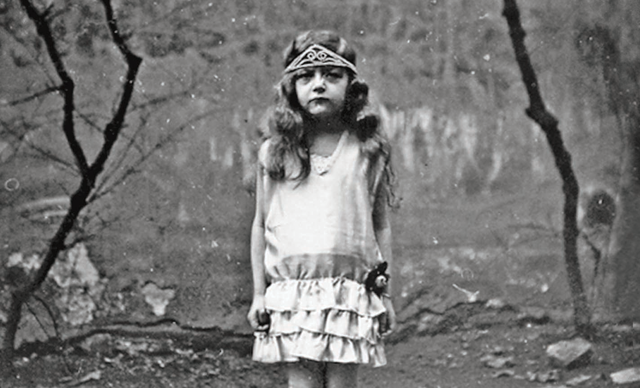When I decide whether or not I want to read a novel, I look at the first sentence. If that doesn’t catch my attention, I’ll set the book down and go to another. This may have been the case with Miss Peregrine’s Home for Peculiar Children by Ransom Riggs, however the first sentence was just vague enough to keep me reading. The text pulled me in—line by line—to its wonderful universe.
Miss Peregrine’s begins in a familiar setting to me: Florida, where I’ve lived for nearly 20 years. The Florida of the book is just as seemingly normal, hot, and sticky as my normal life is, and I believe these points are something Riggs does on purpose. We meet Jacob Portman in his early childhood when he idolizes his grandfather, Abraham, and all of his unique stories from his childhood before WWII accompanied by photographs of people involved.
Slowly, Jacob realizes that these stories and photos can’t be real. There’s no such thing as levitating girls, or invisible boys, and especially boys with bees living inside of him. If he continues to believe his grandfather, he’ll be ridiculed, so he explains this to Abraham, and the wonderful stories that filled Jacob’s head as a child stop. Riggs fast-forwards to Jacob’s teenage years, where he is on the cusp of hitting 16, when tragedy strikes.
Abraham mysteriously and gruesomely dies in Jacob’s arms while babbling about the monsters chasing him. This leaves Jacob psychologically and emotionally scarred. He tries to understand his grandfather’s dying words and how they link to letters discovered from a past paramour and another woman named Miss Peregrine. His parents send him to a psychologist, who suggests they allow Jacob to follow the mystery of the photographs and letters from Abraham’s past.
These objects lead Jacob and his father to Cairnholm, Wales. While there, Jacob journeys across the island to find the home of this Miss Peregrine, who is so far his only lead to more information about Abraham’s childhood. From this point on, the book is all uncanny places, people, and occurrences.
There is much to unwrap in this novel, but my favorite aspect is the fine line that Riggs creates through the narration. It is that of an older man looking back on his life as a young man, giving words and voice to ideas he couldn’t understand then, and isn’t even sure he understands now.
The language is beautiful and captivating, painting a picture of wherever Jacob finds himself so that the reader can clearly envision it. The syntax and word choice evoke a number of different emotions and help guide the reader through the story with Jacob, as if they are feeling his emotions with him. It is perhaps the most well-written young adult novel I have ever read.
The most interesting aspect of this novel, and what sets it off from so many others, are the photographs used throughout. These images are all real, and Riggs either bought them from yard sales or borrowed or purchased them from collectors over the years. These images helped to inspire the story, and some of them are quite disturbing, in particular a demented-looking department store Santa who appears to lack pupils. These photographs add great intrigue to the story, and it makes readers understand Jacob’s character that much more. These pictures filled his childhood and drove him to discover his grandfather’s secret past, and it’s easy to understand why after studying them at length.
Overall, Miss Peregrine’s is a great, fast read. Fast because I didn’t want to put it down, but also written in a way that is simple enough for normal readers to grasp. However, that does not mean the book doesn’t have its own depth. There are so many ways to look at and read the book more deeply. A reader of any level will find something to enjoy with this novel.
Miss Peregrine’s is not only a single novel, but a series, the third of which premieres in late September 2015. Soon, it will be a movie, directed by Tim Burton, and with an eclectic cast. Its release date is schedule for March 4, 2016.
An interesting change I’ve already noted in the movie’s pre-production stage is that Dr. Golan, Jacob’s psychologist and a male in the book, will be played by Allison Janney, a female actress. While this is a relatively small change, I believe it will have an interesting impact on the movie and, possibly, viewers’ interpretations. Jacob of the text is already surrounded by women who are as equally peculiar in their attitudes and personalities as are their talents, so an additional one in the film will be welcome.
While I know that book-to-movie translations cannot capture every scene, there is one scene that I can hope won’t be cut: Jacob’s sixteenth birthday party. Jacob’s parents are well off financially, and it’s reflected in every aspect of their strange family dynamic, especially at the birthday party.
Abraham has just died a short time ago, and Jacob—having witnessed his grandfather’s passing—is lacking in excitement. However, his parents hope to gloss over the fact that Jacob is not doing well mentally for the sake of keeping up appearances and also in the hopes of cheering him up. It’s as if they believe a well-planned party with lots of expensive presents will erase the horrific death he’s just witness.
The scene may appear as a throwaway to a lot of directors, writers, and producers, as they might feel it’s not as important as many other scenes that could be used in its place. I believe that witnessing this dynamic between Jacob and his parents first-hand will help viewers understand much about each of their characters in a very short time, and something that would benefit the film as a whole.
My hope is that Burton captures a very similar feel to his film Edward Scissorhands. Edward, the film’s most aesthetically frightening character, looks very much out of place in the cookie-cutter ‘50s housing he’s brought into. But even though he’s scary to look at, he’s soon discovered to be the most sensitive and empathetic character of the film. The gothic feel of that movie is something Burton should emulate in Miss Peregrine’s. Even the feelings evoked in Alice in Wonderland, with the once-amazing place of Wonderland becoming Underland since Alice has aged, would work well with this Miss Peregrine’s adaptation. In short, Burton has a lot of potential as a director with his specific credentials to create the world described in Riggs’ text and do it great justice.
With Burton, his cast, and a solid writer behind the adaptation, Miss Peregrine’s Home for Peculiar Children is sure to be as much of a success as—if not more successful than—the novel.






